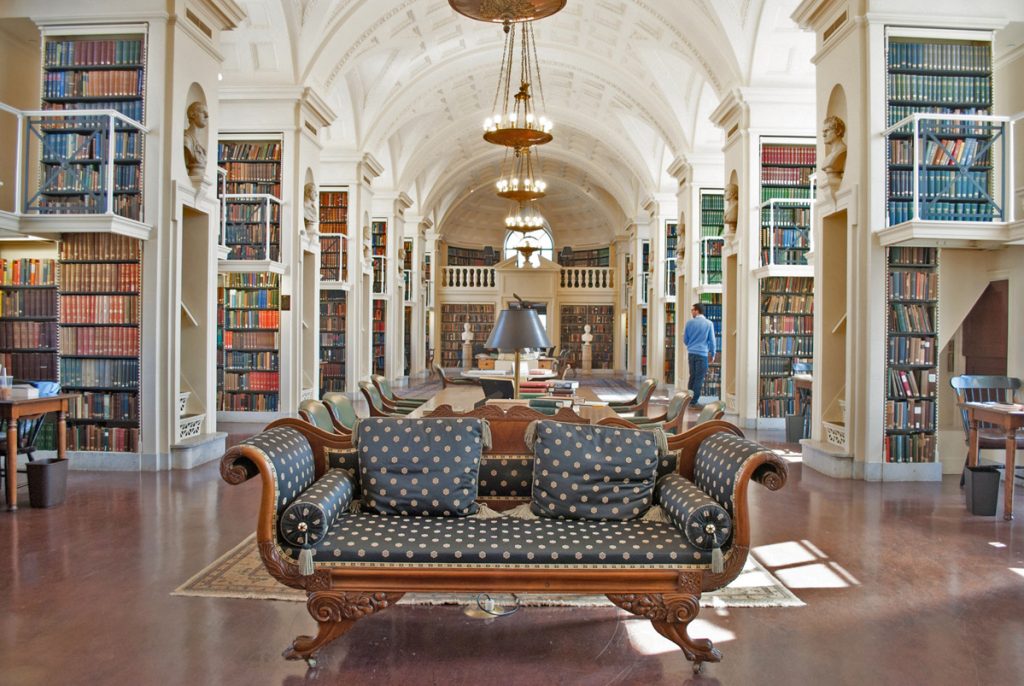by Victoria Johnson

The Boston Athenaeum (BA) is one of the oldest subscription libraries in the United States. Founded in 1807 by prominent society gentleman, today the Athenaeum functions as a library and museum complete with its own archive. Each year, the library hosts numerous events each month, ranging from book talks to lively soirees. While these events, along with the library and art collections, are very popular with patrons, the archives of the institution are usually overlooked. This past September, however, the BA hosted a remarkable live performance event which would have been impossible without using the archive.
On the evening of Tuesday, September 19, 2017, the Athenaeum hosted “A Tale of Two Libraries,” a live event in which a cast of four actors read carefully curated correspondence between the Boston Athenaeum and the London Library. The correspondence was arranged to provide a chronological glimpse into the workings of these two institutions during two defining times, World War I and World War II. This temporal context added depth to an already outside-the-box event. A live reading of a bunch of old letters doesn’t sound all that exciting—and yet, imagine what it would be like to hear the words of four librarians working around bombings and the Blitz. What could have been extremely boring instantly became emotional, real—a good thing it did, too, because that was exactly what its creators intended. To understand how and why this event was so memorable, I sat down with Carolle Morini, the Caroline D. Bain Archivist at the Boston Athenaeum.
As it turns out, an event like this one takes approximately two years to plan. It all started in 2015, when the director of the BA received an inquiry from the London Library, who wanted to know if there was any history of a relationship between the two institutions. The London Library was pleased to learn that there was, indeed, a relationship, confirmed by thirty years’ worth of correspondence held in the BA’s archives. The existence of physical evidence led to a visit from both employees of the London Library, with employees of one of their supporting organizations, International Friends, in tow. In preparation for their visit, Carolle was asked to conduct further research so that she may answer any questions the group may have. She took it one step further by organizing a display case, which included some of the aforementioned letters. As you can imagine, these letters—dated between 1913 and 1945 and detailing the experiences of librarians during wartime—were not only rich in institutional memory, but fostered a personal affection for their authors.
The visitors from the London Library and Carolle discussed options to share these letters with both institutions’ member. It was decided that a live performance would be the best way to share these letters with the public. Jesse Marquese, a writer who had done similar work in New York, came on board as the scriptwriter. With the writing underway, the next step was to figure out the mechanics: who would fund this event? Where would it take place? In the end, it was agreed that the Athenaeum would provide an honorarium and travel expenses for the actors, all of whom were New York based and chosen by Marquese, and that the event would be hosted twice—once in Boston, once in New York City. Marquese shared his script with Carolle, who provided edits in order to provide some local Boston context.
And now we arrive to the night of the event itself. The live production was witnessed by 60 audience members, some of whom were trustees’ emeriti and current trustees and BA staff. Two days later, the production travelled to New York City’s Knickerbocker Club, this time sponsored by International Friends. It has since been suggested that the production travel to the London Library itself in 2018, although this is still in development. Hosting the production at different locations will not only allow more users to experience the performance, but it will also continue to advocate for the value of the Boston Athenaeum’s archives—an element of her job that Carolle admits is difficult to do on a daily basis. As an audience member, I can attest to the power of hearing my own institution’s history through the words of those who came before me.
In her ten years as the sole archivist at the Athenaeum, Carolle can only recall one other event that utilized the archives. This is not to say that the events coordinators are uninterested in using the archives, but there is often little correlation between book talks and the institutional archives. That is exactly why projects like the live performance are crucial in advocating for the important of Carolle’s work as the archivist and of the archives themselves. Carolle anticipated an increase in archival inquiries after the event, which has not (thus far) transpired. However, perhaps even more valuable is that all who attended—the Athenaeum director, patrons, and staff—were able to recognize the importance of the BA’s archives and of all archives. In the end, Carolle considers this project a success: “it made people see that the work that I do is important.” Recognition and respect should, after all, be the goal of any advocacy project.
